Hawks are majestic birds of prey that often captivate our attention due to their impressive size and hunting prowess. However, finding these raptors frequently around your house can provoke a mixture of awe and concern. It’s important to understand that hawks are attracted to certain environments for specific reasons. These can include the availability of food sources, suitable nesting sites, or the absence of predators. In this article, we will delve into why hawks may be frequenting your property and how to cohabit peacefully with these magnificent creatures.
Understanding the Symbolism Behind Spotting a Hawk
In Native American folklore, for instance, a hawk sighting is often considered a call to be observant and to pay attention to the surroundings since hawks are known to have a sharp eye and keen observation. On a spiritual level, they are associated with intuition, wisdom, and seeing things from a higher level of perspective. Therefore, an encounter with a hawk could be a potent reminder of these traits and might be telling you to take a broad view of life’s circumstances. Remember, however, that these interpretations of symbolism are subjective and may vary among different cultures and individuals.
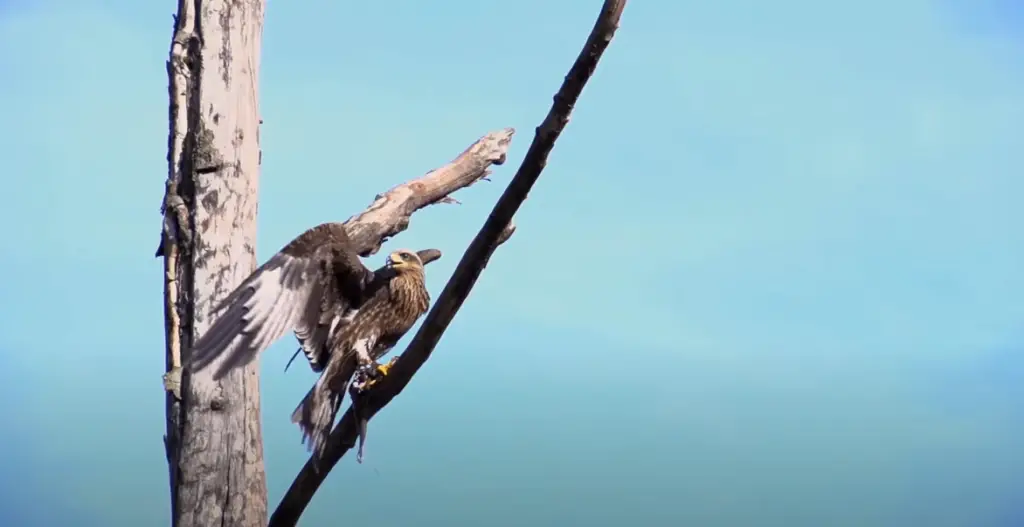
What Are the Reasons Behind Hawks Visiting Your Property?
Hawks are usually attracted to properties due to the presence of food sources, shelter, and a danger-free environment.
If you have poultry or rodents living on your land, hawks may be drawn in by the prospect of an easy meal. Similarly, if you live near open fields, marshes, or other areas that are home to a variety of small animals and birds, hawks may be frequenting your property in search for food.
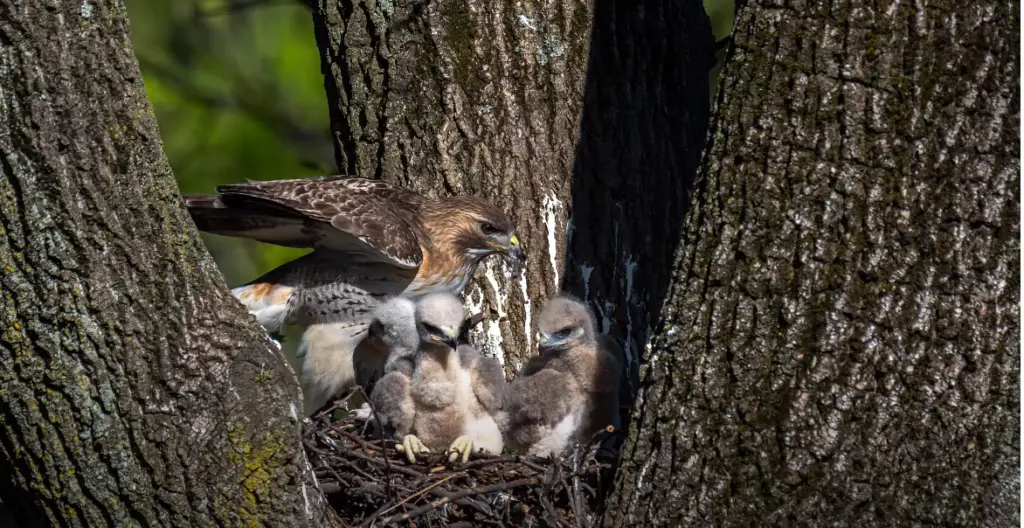
Another reason a hawk might be drawn to your house is due to the presence of suitable nesting sites. If you have tall trees on your land or even if your roof has enough height for them to perch on, it could be that a hawk is looking for a spot to make its nest.
Finally, hawks may be attracted to your property due to the absence of predators. If you have cats and dogs in your home or if your neighbor’s house has any kind of pets, this could keep away hawks from settling near your area.
Taking Steps to Coexist Peacefully with Hawks
If you have a hawk frequenting your property, it is important to remember that they are protected by law and should not be harmed or chased away. Instead of trying to evict them, here are some simple steps you can take to cohabit peacefully with these feathered visitors:
Provide alternative food sources like bird feeders that are more easily accessible to small birds, instead of leaving out large piles of grain or other items that could attract hawks.
If you have poultry on your property, keep them in a secure and enclosed area where they cannot be seen by the hawk.
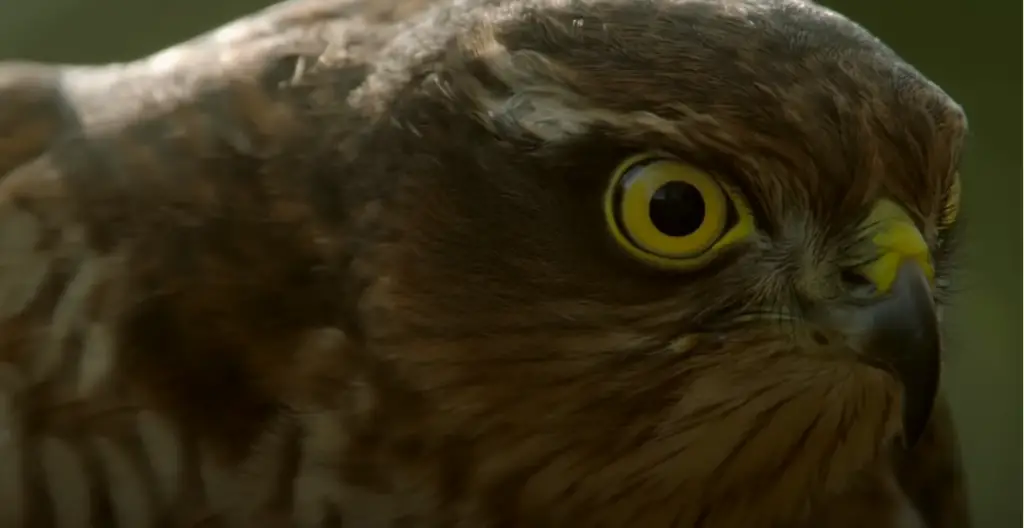
Prune any trees or shrubs that may be providing shelter to the hawk, as this may discourage them from staying in the area.
If you have cats or dogs in your home, make sure they stay indoors when a hawk is present, as these animals could pose a threat to it.
By taking these steps and understanding why hawks are attracted to your property in the first place, you will be able to cohabit peacefully with these majestic creatures. [2]
Effective Methods for Detering Hawks from Your Home Safely
While cohabiting peacefully with hawks is the ideal scenario, there may be situations where their presence poses a threat to your domestic pets, poultry, or even small children. In such cases, it is crucial to deter hawks in a manner that does not harm them. Here are a few humane strategies you can adopt:
Install visual deterrents: Hawks have a keen sense of sight. Visual deterrents like shiny CDs, aluminum foil windmills, or scarecrows can be effective in keeping them at bay.
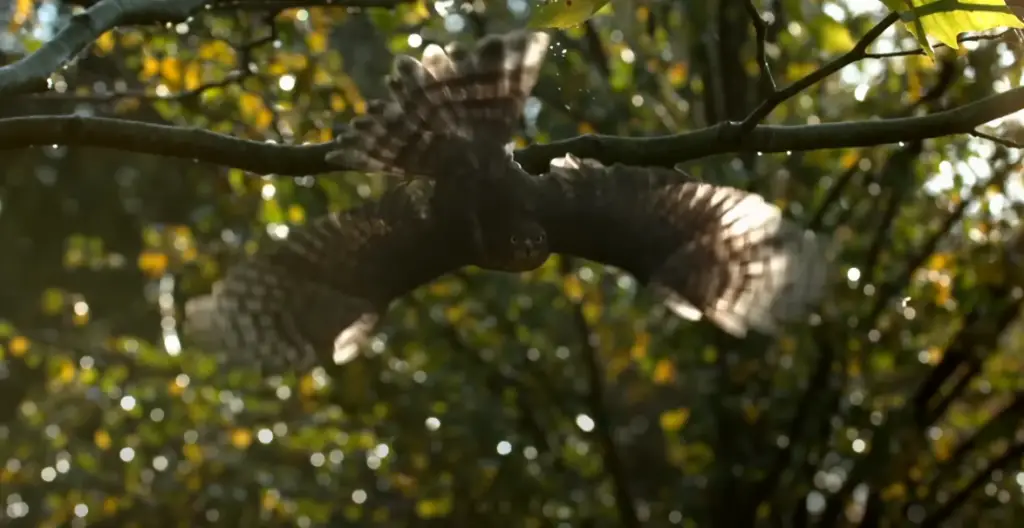
Use noise deterrents: Devices that emit predator calls or loud noises can dissuade hawks from approaching your property.
Install protective netting: If hawks are preying on your poultry or fish from a pond, consider installing a net or wire mesh to protect them.
Keep the vicinity clean: Regularly clean your backyard to avoid attracting rodents or small animals, which hawks prey upon.
Use bird repellents: There are specific bird sprays and gels available in the market that can deter hawks without causing them harm.
Remember, these methods should be employed as preventive measures and not to cause harm to the hawks. Hawks are protected under the Migratory Bird Treaty Act, and it is illegal to harm or kill them. Always prioritize coexistence over confrontation for a harmonious relationship with these birds.[1]
What is the typical duration for which hawks remain in a specific area?
The duration that a hawk stays in a specific area can vary greatly based on several factors such as the availability of food, the presence of suitable nesting sites, and the time of year. Hawks are known to be migratory birds, often changing locations with the seasons and in response to food availability. During the breeding season, they tend to stay in a particular area until their young are ready to fly. On average, this could be for about 2 to 3 months. Outside of the breeding season, hawks may remain in an area as long as there is an ample supply of food and minimal disturbance. However, they will relocate if food becomes scarce or if they feel threatened. With that said, you can expect to see a hawk in your backyard for a few weeks or even months depending on the above-mentioned factors.
After all, these birds are more than just fascinating creatures to observe; they are powerful symbols of strength, resilience, and freedom. So the next time a hawk visits your property, take a moment to appreciate their presence and enjoy this connection with nature.
What Are Some Common Hazards Posed by Hawks?
Although hawks usually pose no direct danger to humans, there are some precautions you should take if hawks are frequenting your property. One of the biggest hazards posed by these birds is their talons, which they use to catch and hold prey. As a result, it’s best to keep small children and pets away from areas where hawks might be perched or hunting.
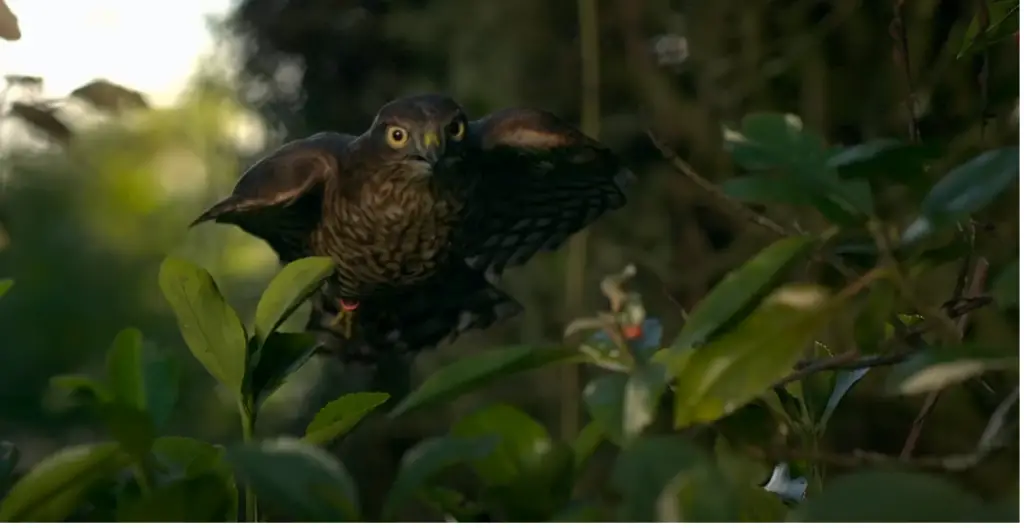
In addition, if you have poultry or other small animals on your property, hawks can pose a serious threat to them. In such cases, it is important to take preventive measures like installing protective netting or deploying visual deterrents.
Overall, hawks are typically not aggressive toward humans and should not be feared. Most of the time, their presence in our backyards is simply a reminder of the beauty and complexity of nature. However, it’s still important to take common-sense safety measures when they are around. By understanding the natural habits of hawks and taking these steps, you can cohabit peacefully with our feathered visitors while keeping yourself and your family safe. [3]
FAQ
What steps can I take to entice hawks to visit my property?
If you are interested in attracting hawks to your property, there are several steps you can take:
Plant native trees and shrubs: Hawks are attracted to areas that mimic their natural habitat. By planting indigenous trees and shrubs, you can create an inviting habitat for birds to perch and thrive while satisfying their hunting instincts.
Install a bird bath: Hawks need fresh water for drinking and bathing. A bird bath can be a great attractant.
Maintain some open space: Hawks are predators that prefer to have a clear view of their surroundings while hunting. Keeping some open space in your yard can make it more appealing to them.
Avoid using pesticides: Pesticides can kill the small animals and insects that hawks feed on. By avoiding the use of these chemicals, you can help ensure that hawks have access to a steady food supply.
Create a habitat for small birds: Hawks are predators and are attracted to areas where their prey is abundant. Attracting small birds to your yard can indirectly attract hawks.
Remember to observe but not disturb the hawks. It is crucial to honor the natural behaviors and habitats of these legally protected birds.[5]
Can I feed or provide food for the hawks?
Feeding hawks is generally not recommended. Hawks are wild animals with specific dietary needs and feeding them can alter their natural hunting behaviors, potentially leading to dependency on humans for food. Furthermore, providing food for hawks can attract them to areas where they might be in danger from human activity or domestic pets. Hawks primarily eat small mammals, birds, reptiles, and insects, which they are perfectly capable of hunting in their natural environment. It is important to respect their natural behaviors and ensure that any actions taken do not disrupt the balance of their ecosystem. Instead of feeding them, consider creating an environment that attracts their natural prey, thus providing a natural food source for the hawks. Always remember, these birds are protected under the Migratory Bird Treaty Act, and it is illegal to harm or kill them.
By understanding and respecting the natural habits of hawks, you can make sure that your backyard is a safe and enjoyable place for both humans and birds alike. With a little patience and effort, coexistence with these majestic creatures can be an enjoyable experience for everyone.[2]
Are hawks legally protected under the law?
Yes, hawks are legally protected under the law. They fall under the protection of the Migratory Bird Treaty Act in the United States, an agreement that makes it illegal to hunt, capture, kill, or sell birds that are listed under this act. This law also applies to various components of the bird, encompassing feathers, eggs, and nests. A violation of this act can lead to hefty fines and criminal charges. The purpose of this Act is to ensure the survival and sustainability of these bird species by protecting them and their habitats. Therefore, if hawks frequent your property, it’s crucial to respect their presence and avoid any activity that can harm them or disrupt their natural behavior.
By understanding the legal protection afforded to hawks and taking steps to coexist with these birds peacefully, you can ensure that both humans and hawks can enjoy the natural beauty of your backyard.
What Are Some Benefits of Having Hawks Around?
Having hawks around can offer several benefits to humans and the environment alike. Their presence is a sign of a healthy, diverse ecosystem that is teeming with prey for these birds. These raptors are also efficient hunters, helping keep rodent and insect populations under control by preying on them. Hawks also have the potential to bring beauty and wonder to a backyard, providing hours of entertainment for birdwatchers.
In addition, having these birds around can be a great teaching opportunity for children. By observing hawk behaviors in their natural environment, kids can learn about the complexity of nature as well as their place within it.
Overall, hawks can be an asset to our backyards and gardens. They should be respected and appreciated for all the benefits they bring to us humans and the environment alike. [4]
What is the distinction between a hawk and a falcon?
Hawks and falcons are both powerful birds of prey but they differ significantly in their physical characteristics, hunting habits, and behaviors.
Hawks are generally larger and have broad, rounded wings and a wide tail, which allows them to soar and glide for long periods. In contrast, falcons are usually smaller with pointed wings and a narrow tail, making them incredibly fast flyers.
Hawks depend mainly on their sharp eyesight for hunting, using it to detect prey from great heights and swiftly capturing it with their powerful talons. In contrast, falcons are renowned for their outstanding velocity and agility. They often hunt by diving at high speeds to strike their prey in midair.
Behaviorally, hawks are generally solitary animals and prefer to hunt alone. Falcons, however, are more social and may be seen hunting in groups.
These differences, among others, highlight the incredible diversity within the birds of prey family. So, while they can look similar at a glance, a closer look reveals a world of differences between these two magnificent creatures.[6]
Do hawks pose a threat to humans or pets?
Hawks, as birds of prey, typically pose very little threat to humans. They are usually more interested in rodents, avian creatures, and various other small animals. However, they have been known to defend their nests vigorously if they feel threatened, which can include swooping at perceived threats. As for pets, small animals like rabbits, guinea pigs, and small dogs or cats could potentially be at risk, particularly if left unsupervised outdoors. Even so, such incidents are relatively rare. It’s always a good idea, though, to keep a close eye on small pets when they’re outside, especially if you know hawks are present in your area. Remember, hawks are protected by law and should not be harmed; the goal is to coexist with these wonderful creatures as peacefully as possible.
Does killing a hawk bring bad luck?
The notion of killing a hawk brings bad luck is largely a matter of cultural or personal belief, and it doesn’t have a scientific basis. In many cultures, hawks are seen as powerful and spiritual creatures, and causing harm to them could be considered an act of disrespect against nature, leading to misfortune or bad luck. However, from a practical standpoint, harming a hawk is against the law in many regions due to the protections granted under the Migratory Bird Treaty Act. Violating this Act may result in significant consequences such as fines and imprisonment, which some might interpret as “bad luck.” Therefore, regardless of personal or cultural beliefs, it’s best to respect these magnificent creatures and the laws that protect them.
What is the significance of frequent hawk sightings?
Frequent hawk sightings can signify that your property provides an ideal environment for these birds, including suitable food sources and nesting opportunities. It can also reflect the season, as many raptors migrate to certain regions during specific times of the year for breeding or hunting. From a spiritual perspective, in many cultures, a hawk’s sighting represents a message from the divine, symbolizing vision, focus, and strategy. It’s a reminder to view situations from a higher perspective. However, from a naturalist’s viewpoint, seeing these magnificent birds often is an indication of a healthy ecosystem, with an adequate population of prey and a lack of excessive human disturbance. Remember, these are wild animals, and their presence should be appreciated from a distance, ensuring we do not disrupt their natural behaviors.
Overall, hawk sightings are a reminder of the beauty and complexity of nature. It is essential to recognize and respect their presence while taking common-sense safety measures to ensure that everyone can enjoy their backyard safely. With a bit of patience and effort, coexistence with these majestic creatures can be an enjoyable experience for both humans and birds alike.[3]
Are Hawks Friendly To Humans?
Hawks are typically not friendly to humans in the sense of seeking interaction or companionship, as they are wild animals with instincts and behaviors. Their primary focus revolves around survival activities such as hunting for food, establishing territory, and raising their young. However, hawks generally do not pose a threat to humans unless they feel their nest is threatened. In such cases, they may behave defensively. Most interactions between humans and hawks occur at a distance, with humans observing these magnificent birds as they go about their daily routines. It’s essential to respect hawks as wild creatures and observe them from a distance, refraining from attempts to feed or interact with them directly. This ensures your safety and preserves the natural behavior and habitat of these powerful birds of prey.[5]
Useful Video: How to Attract Hawks to Your Backyard
Conclusion
In conclusion, hawks are captivating and vital creatures that play a crucial role in preserving ecological equilibrium. Their presence indicates a healthy environment, and they provide natural pest control by preying on rodents and insects. Despite being powerful predators, they typically pose little threat to humans, although small pets should be supervised outdoors. It’s essential to remember that these birds are legally protected, and causing them harm not only disrupts nature but can also lead to legal consequences. Rather than seeing these birds as a nuisance or a threat, we should appreciate their beauty and the benefits they bring to our environment, learning to coexist peacefully with them.
References:
- https://theworldsrarestbirds.com/why-are-hawks-hanging-around-my-house/
- https://impeccablenestdesign.com/dream-meanings/the-spiritual-meaning-of-seeing-a-hawk-a-comprehensive-guide/
- https://birdcageshere.com/2021/07/12/how-long-do-hawks-stay-in-one-area/
- https://misfitanimals.com/hawks/do-hawks-stay-in-the-same-area/
- https://birdwatchingpro.com/why-is-there-a-hawk-in-my-yard/
- https://selebriti.cloud/en/why-are-hawks-hanging-around-my-house/





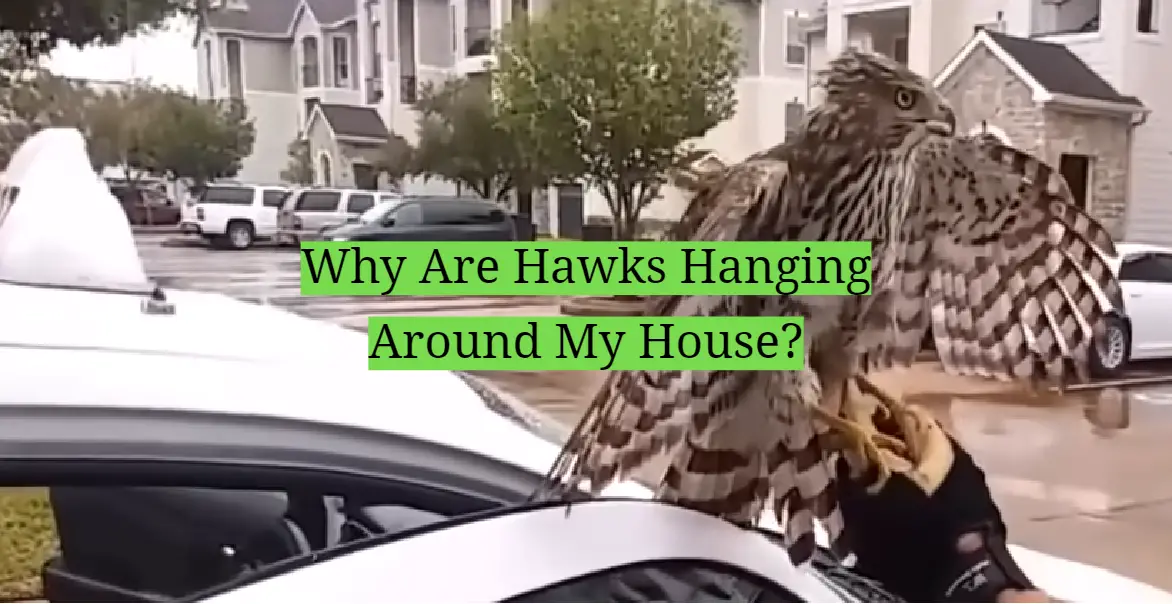








Leave a Reply